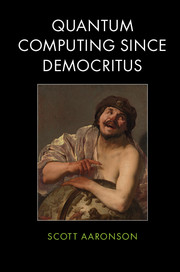Book contents
- Frontmatter
- Dedication
- Contents
- Preface
- Acknowledgments
- 1 Atoms and the void
- 2 Sets
- 3 Gödel, Turing, and friends
- 4 Minds and machines
- 5 Paleocomplexity
- 6 P, NP, and friends
- 7 Randomness
- 8 Crypto
- 9 Quantum
- 10 Quantum computing
- 11 Penrose
- 12 Decoherence and hidden variables
- 13 Proofs
- 14 How big are quantum states?
- 15 Skepticism of quantum computing
- 16 Learning
- 17 Interactive proofs, circuit lower bounds, and more
- 18 Fun with the Anthropic Principle1
- 19 Free will
- 20 Time travel
- 21 Cosmology and complexity
- 22 Ask me anything
- Index
4 - Minds and machines
Published online by Cambridge University Press: 05 April 2013
- Frontmatter
- Dedication
- Contents
- Preface
- Acknowledgments
- 1 Atoms and the void
- 2 Sets
- 3 Gödel, Turing, and friends
- 4 Minds and machines
- 5 Paleocomplexity
- 6 P, NP, and friends
- 7 Randomness
- 8 Crypto
- 9 Quantum
- 10 Quantum computing
- 11 Penrose
- 12 Decoherence and hidden variables
- 13 Proofs
- 14 How big are quantum states?
- 15 Skepticism of quantum computing
- 16 Learning
- 17 Interactive proofs, circuit lower bounds, and more
- 18 Fun with the Anthropic Principle1
- 19 Free will
- 20 Time travel
- 21 Cosmology and complexity
- 22 Ask me anything
- Index
Summary
Now we're going to launch into something I know you've all been waiting for: a philosophical food fight about minds, machines, and intelligence!
First, though, let's finish talking about computability. One concept we'll need again and again in this chapter is that of an oracle. The idea is a pretty obvious one: we assume we have a “black box,” or “oracle,” that immediately solves some hard computational problem, and then see what the consequences are! (When I was a freshman, I once started talking to my professor about the consequences of a hypothetical “NP-completeness fairy”: a being that would instantly tell you whether a given Boolean formula was satisfiable or not. The professor had to correct me: they're not called “fairies”; they're called “oracles.” Much more professional!)
Oracles were apparently first studied by Turing, in his 1938 PhD thesis. Obviously, anyone who could write a whole thesis about these fictitious entities would have to be an extremely pure theorist, someone who wouldn’t be caught dead doing anything relevant. This was certainly true in Turing’s case – indeed, he spent the years after his PhD, from 1939 to 1943, studying certain abstruse symmetry transformations on a 26-letter alphabet.
Anyway, we say that problem A is Turing reducible to problem B, if A is solvable by a Turing machine given an oracle for B. In other words, “A is no harder than B”: if we had a hypothetical device to solve B, then we could also solve A. Two problems are Turing equivalent if each is Turing reducible to the other. So, for example, the problem of whether a statement can be proved from the axioms of set theory is Turing equivalent to the halting problem: if you can solve one, you can solve the other.
- Type
- Chapter
- Information
- Quantum Computing since Democritus , pp. 29 - 43Publisher: Cambridge University PressPrint publication year: 2013



